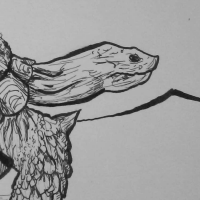A Declaration of the Rights of the Worldly Peoples
The gods! The gods! There are cities that even the carrion crow dares not overfly, and you would talk to me of the will of the gods? The death of a world lays at their feet! May the plague strike down the gods, and if any remain may they meet my sword!The most well-known manifesto to come out of Veshiri, A Declaration of the Rights of the Worldly Peoples is a thorough and damning condemnation of the gods of that planet and their failure to protect their peoples from the ravages of the world, not least among them the Great Plague that wiped out as many as three-fifths of the planet's population in a single century and was still ravaging the world at the time of publication.
Purpose
To condemn the gods and call for the end of their power
Document Structure
Clauses
Sabi begins with an introduction to the plagues, and a harsh examination of the tremendous death toll. She then relates the story of an elf who died upon the steps of the temple that raised her, begging for succor but refused out of fear of the disease.
The Declaration has many subsections, as Sabi breaks down her arguments and counterarguments. Her primary persuasive mode is to bring up every defense of the gods she can think of, then systematically tear them down through both appeals to logic and emotion, and the section containing this, called the Refutation, comprises a good two thirds of the manifesto. The Vision section concludes the manifesto, laying out her utopian ideal of a world without gods, where the elven people labor for the exaltation of their own souls, temples are re-purposed as hospitals and houses of learning, and religious hatred and discrimination is forgotten in favor for love for one's fellows.
References
Sabi makes wide reference to previous texts, especially the encyclopedic The World Enclosed, being a history of the peoples of the world, which she uses as a rather thorough chronicle of the misfortunes of the world, especially those brought about directly or indirectly through divine influence. So, too, does she reference other declarations of rights and religious texts, in order to argue that the souls of elves cannot truly be free and in possession of the full rights to which they are entitled while bent under the yoke of the gods.
Publication Status
The Declaration is widely accessible
Historical Details
Background
The Great Plague, the worst of the star plagues, began to race about the entirety of Veshiri in the year 1,711 of the Dawn Era. A year later, it wiped out a certain village, leaving a young elf girl, Sabi Jobai, as the only survivor. She was taken in by a temple, from which she later ran away from to join the Order of the Serpent in 1,630 of the Dawn Era. The Serpents had formed to forge a life for the elves free of the gods' influence, judging them at best unable to be relied upon, as they had done nothing to stop the plague from ravaging the world. The people's once great faith in their deities had indeed been shaken horribly, with several religious leaders arranging mock trials for their gods in an effort to question why.
Sabi, however, had an unusual anger in her heart, and found that the Serpents did not condemn the gods thoroughly enough for her taste.
History
In 1,628 of the Dawn Era, Sabi Jobai published the most infamous of her works, A Declaration of the Rights of the Worldly Peoples. It rapidly became the most widely published manifesto in history, igniting discussion across the globe. The Serpents reacted somewhat coldly, as the manifesto singled them out as not radical enough, but many approached Sabi in private to agree with her. A year later, she announced that she was striking out on her own with those who would follow her, forming the Order of the Black Rose.
Public Reaction
The Declaration landed in mixed waters, provoking a tremendous variety of reactions - but all agreed that it was certainly important, whether it was the foremost example of blasphemy in their time or a call to action against the tyranny of the divine.
Legacy
The Declaration had a tremendous impact on Veshiri, and is widely regarded as the seminal work of the pre-modern eras. It marked the beginning of a sharp decline in worship of the gods, and is one of the most commonly assigned readings in schoolhouses. It has attracted some attention outside of Veshiri, despite being published well over a thousand years before official interplanetary contact, and has inspired similar declarations from other peoples throughout the multiverse who feel their gods either do not enough or do too much.
Type
Statement, Political (Manifesto)
Medium
Paper
Authoring Date
1,631 of the Dawn Era
Location
Authors





i really like that quote- it certainly adds to the mood the article is building up to, if that makes sense? and you did a good job of showing its effect on society and culture. great article!